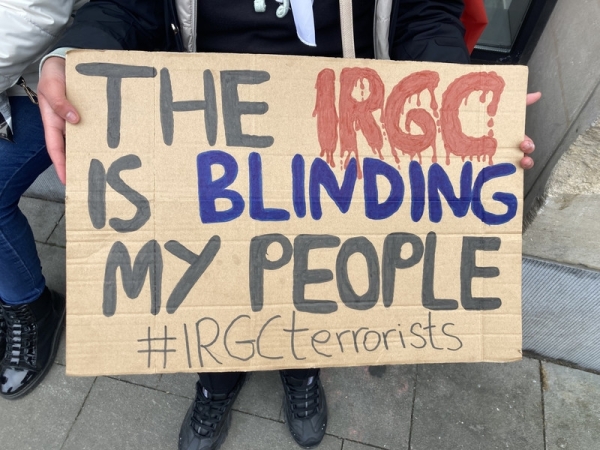EU should list Iranian guard as terrorists, dissidents tell MEPs
Prominent Iranian human rights defenders are demanding the EU list the Islamic Revolutionary Guard Corps (IRGC) as a terrorist organisation.
"Call the IRGC what it is and officially name this nefarious, bloodthirsty and corrupt entity as a terrorist organisation," said Hamed Esmaeillion, an Iranian-Canadian social activist.
Esmaeillion’s comments were made in a hearing with MEPs sitting on the human right committee on Tuesday (25 April).
The European Parliament has been demanding the Council, representing member states, list the IRGC as a terrorist group, as well as the paramilitary Basij militia and the Quds Force.
"Not only do they wield terror on the Iranian people, but they commit terrorist acts, even on our European soil," said Raphaël Glucksmann, a French socialist MEP.
"How is it not recognised as a terrorist organisation?," he asked.
Last month, senators on the US foreign relations committee posed the same question.
In a letter sent to the EU’s foreign policy chief, Josep Borrell, they say that EU reluctance "ignores the Iranian government’s goal of sowing terror in the West."
But a representative from the EU’s foreign policy branch, the European External Action Service (EEAS), told the MEPs that any such decision requires unanimity among EU states.
When pressed to name the EU states that are holding back on placing the IRGC on a terrorist list, he refused.
"You know very well that I’m not in a position to share the names of the member states," he said.
The Financial Times newspaper had earlier this year said both France and Germany support the terror designation, at the risk of derailing international efforts of preventing Tehran developing a nuclear bomb.
A meeting of EU foreign affairs ministers in Luxembourg had also earlier this week expanded its restrictions against the regime.
This includes sanctions against Ariantel, an Iranian mobile service provider, which is being used to spy on people. It also imposed restrictive measures on lawmakers in the Iranian parliament, as well as members of IRGC.
The total EU measures now span restrictions on some 211 individuals and 35 entities in Iran.
Regime’s days numbered
Restrictions aside, the regime continues to clamp down on its own people.
But Fatameh Karimi, a women’s right activist and president of the Kurdistan human rights network in France, says the regime won’t survive.
"Thanks to this question of headscarf, this question of women, we can see the end of the Islamic Republic," she told the MEPs.
She said there is a change of mentality in Iran whereby disparate groups are now united in their opposition against the regime.
"We see that the regime are afraid of the movement, and there’s no going back," she said.
Similar comments were made by Mahdieh Golroo, an Iranian journalist and women’s rights activist. "People support each other," she said.
"It’s very, very important because it’s a break down for the strategy of the regime to make an enemy from people against each other," she said.
A mass uprising in Iran against the regime followed the killing of Mahsa Jina Amini, a 22-year old Iranian Kurdish woman. She had been arrested in September 2022 by Iran’s morality police for not properly wearing a headscarf. She was then beaten to death.
Nationwide protests erupted in over 120 cities in almost all of Iran’s 31 provinces, involving hundreds of thousands of Iranians from all segments of society.
Golroo says the slogan ‘Women Life Freedom’ has helped galvanise a revolution that can bring out a change in the regime. But repression continues, with sham trials, executions and imprisonment of protestors and activists.
Renewed gas attacks against school girls also continue amid suspicion that they are being carried out by the government, which denies it.
Need for internet access
Last year, the Iranian government cut off the internet to some 80 million people. In response, the US expanded a so-called Iran General License D-2, in order to ease the flow of information to the population.
"We are not seeing any of these big technology companies actually implement it," said Golroo.
"It’s not only access it’s also about security," she said, noting that people in Iran need to be able to store their data outside of Iran.

